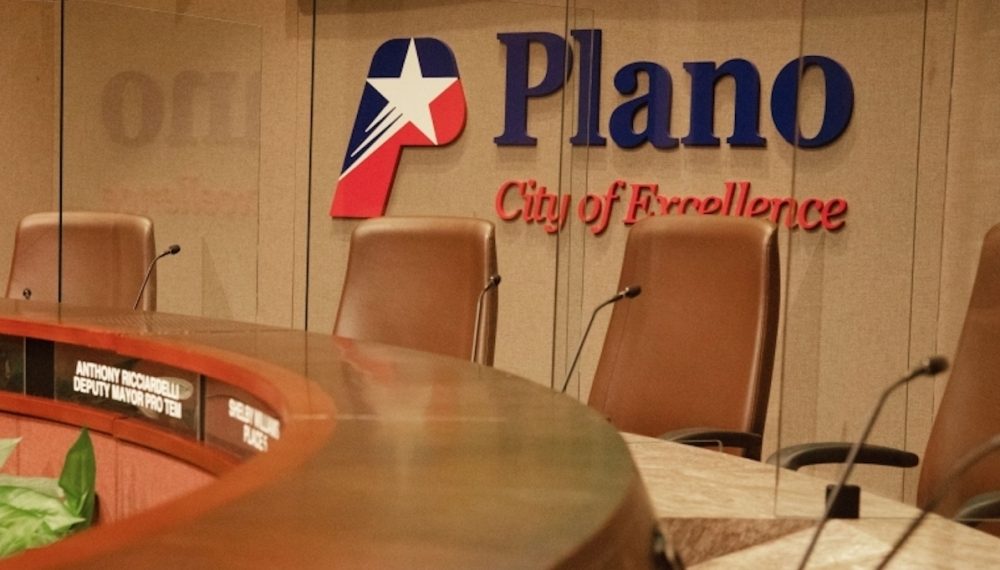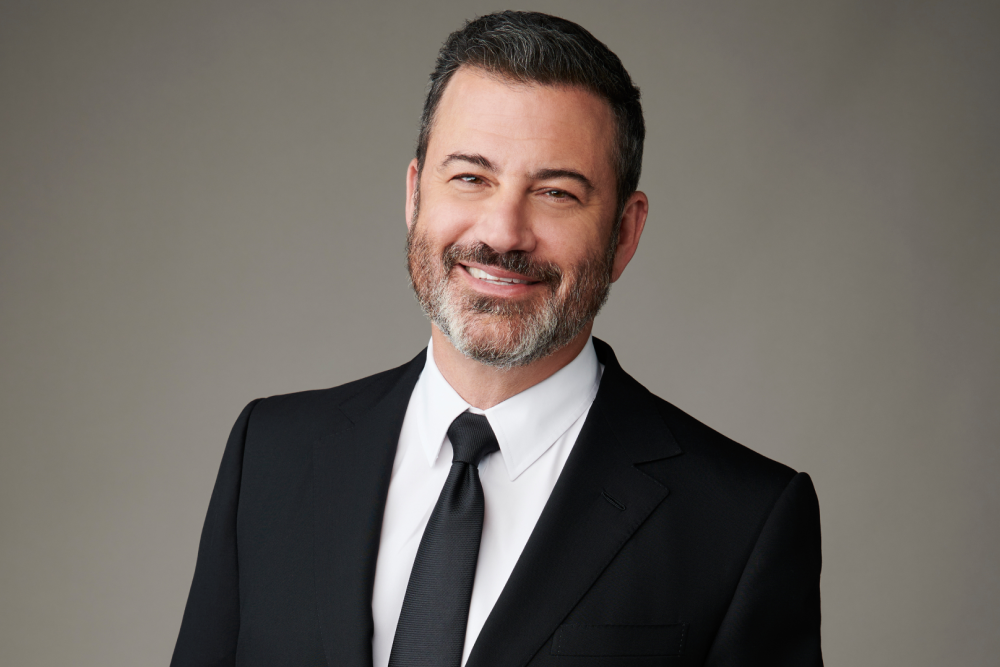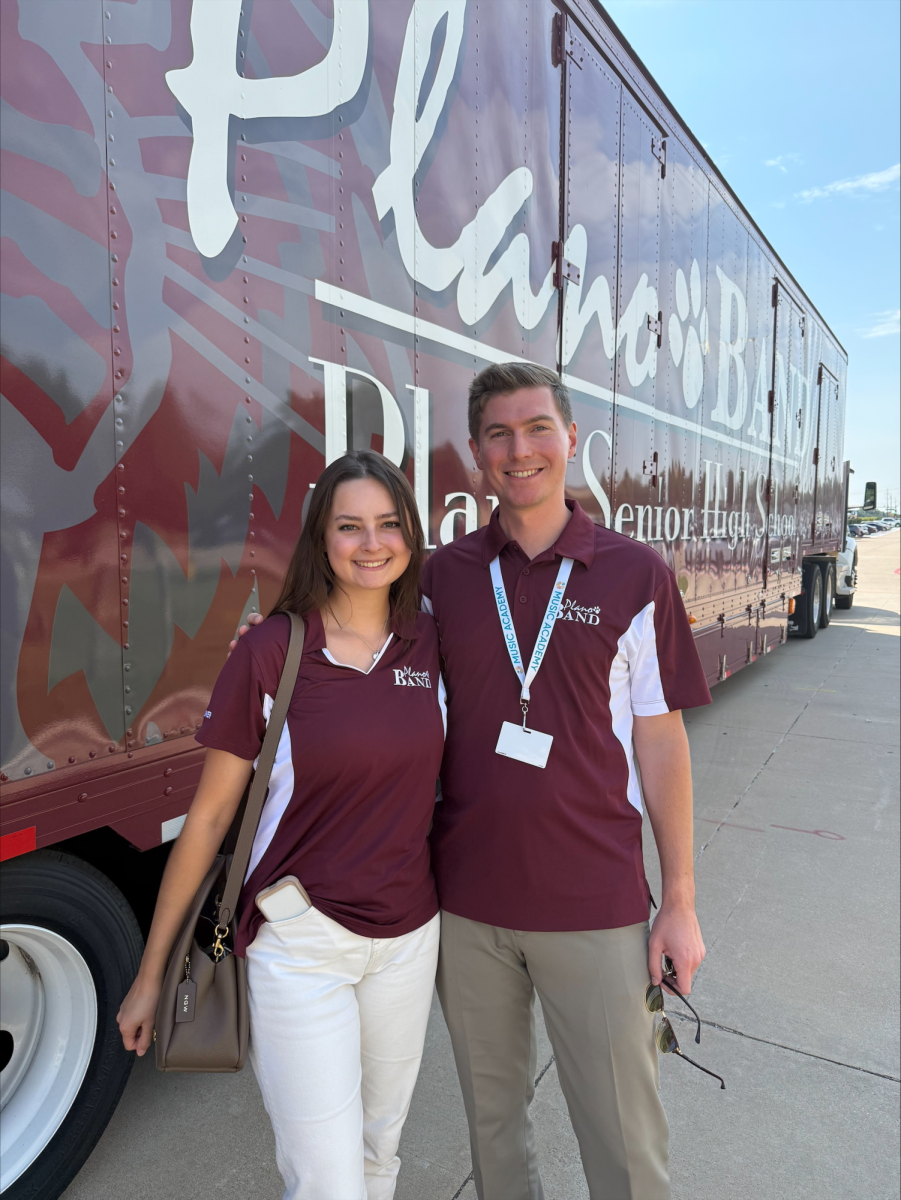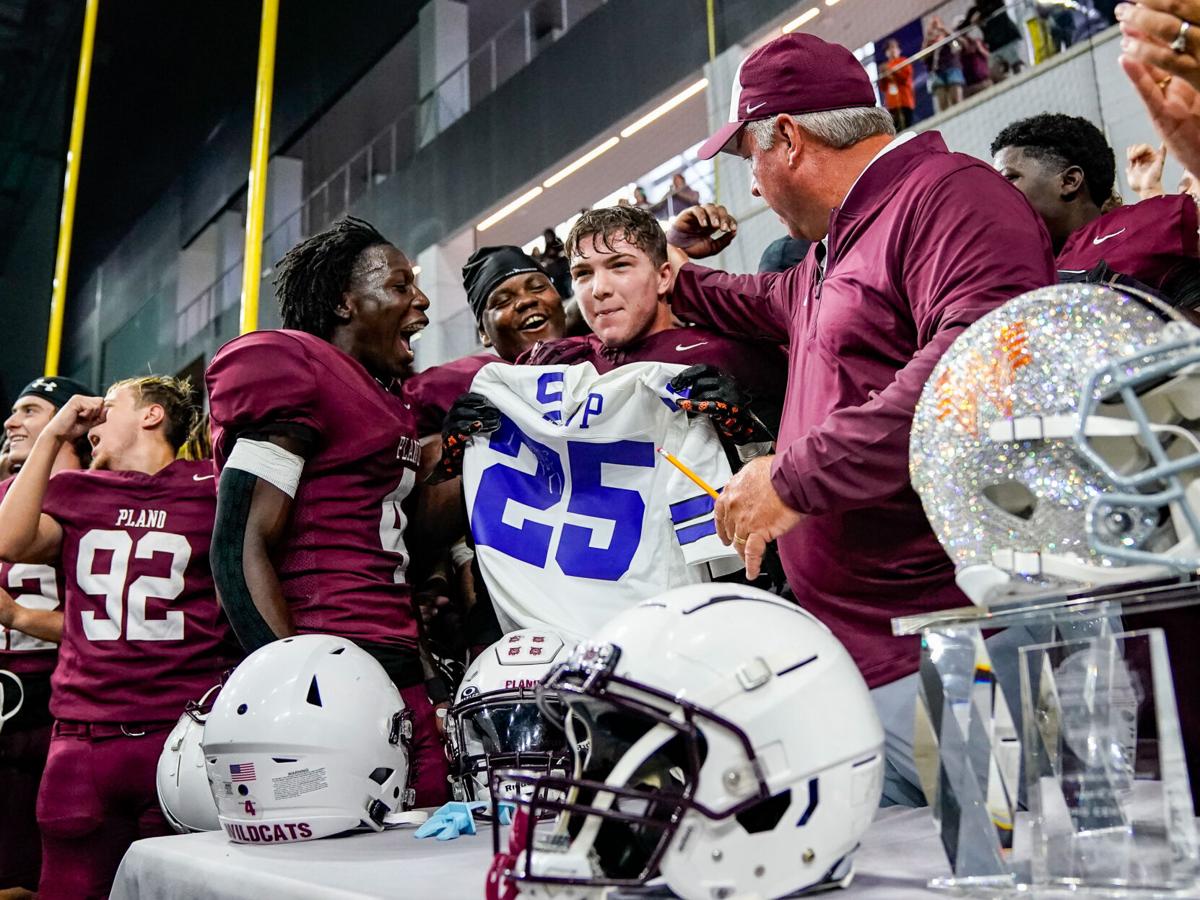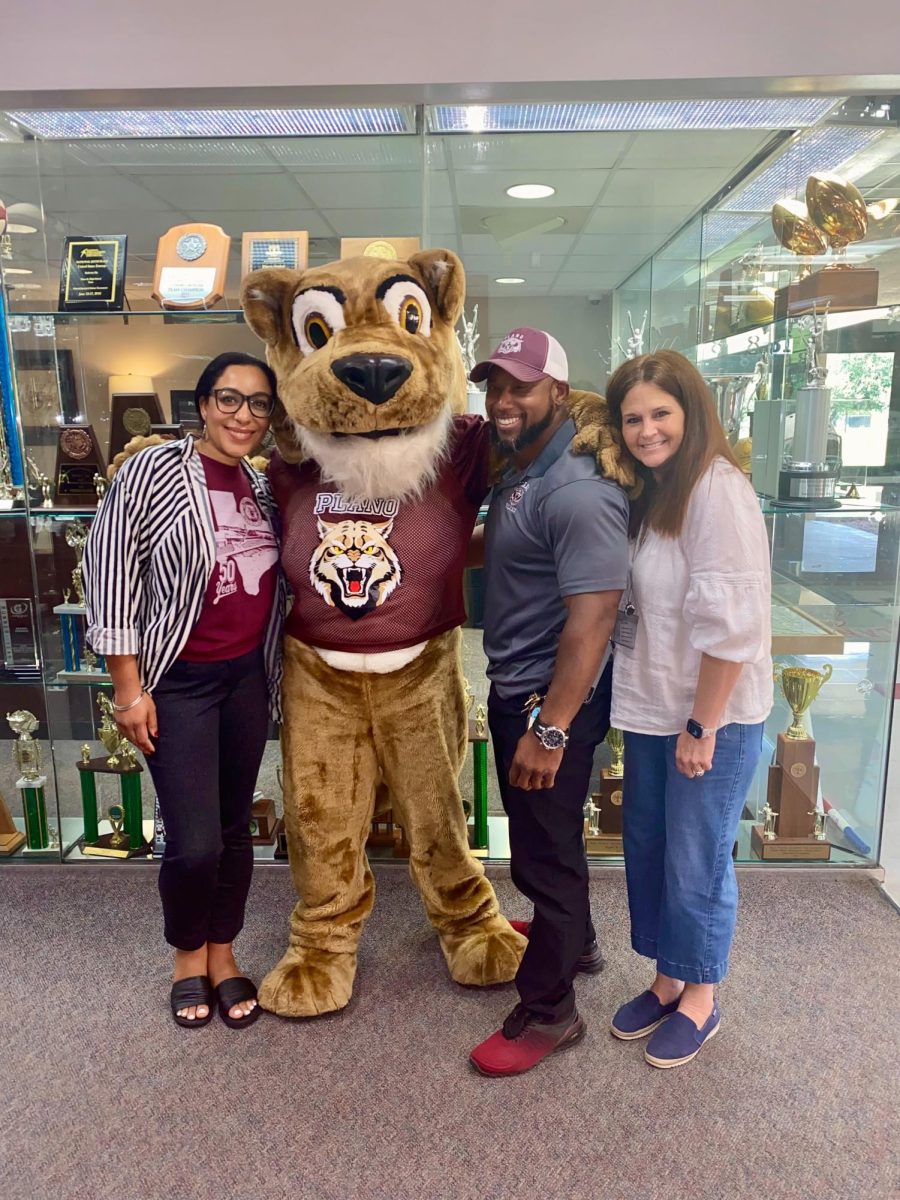Engineering Design and Problem Solving
Students this past year had the option of taking Engineering Design and Problem Solving, a course designed by the Cockrell School of Engineering at the University of Texas at Austin. The students, working primarily in teams, complete a design build project and a separate research project every six weeks. Engineering teacher Joseph Fawcett spent six weeks in the summer at UT completing a full time professional development course to help bring the engineering program to Plano.
“We had a few different purposes for proposing the course to the New Course Committee,” Fawcett said. “We believed that students would benefit from exposure to this type of class before college. Our campus did not have many non-AP fourth-year science options. Finally, we thought that it would be really interesting to see students combine their learning in previous courses with the lessons of the new course.”
Junior Devin Marvin said he took the class to learn more about engineering and because it sounded like a fun class. He said that the class both met his expectations and surprised him.
“I knew that engineering would be fun,” Marvin said. “However, it’s different than what I thought it would be. Engineering requires a lot of teamwork and group skills, as well as creativity. The projects we do are incredibly fun, and I’m always excited to see what we’re doing next.”
Although students work mainly in groups, students are held accountable for their contributions to the team. The design build projects require students to design and actually construct structures to perform certain tasks. They began the year with a reverse engineering project where the students took apart a hair dryer and determined how its components functioned. Next, they created pinhole cameras to actually take pictures according to a customer’s wishes. Later in the year, the students launched digital cameras into the air with balloons as part of an aerial imaging unit.
“They had to come up with the structure to hold the camera, a way to get it down safely, build a circuit to trigger the camera to take pictures, and program it,” Fawcett said.
Next year, students will be able to use their engineering notebooks for their finals. In addition, the list of projects will be tweaked and improved.
“Students gain insight into the engineering design process and get a chance to apply math and science to projects,” Fawcett said. “They will learn idea generation and concept selection techniques. Hopefully they will have an enjoyable exposure to the field of engineering.”
Zero Hour Honors English 3 and 4
Head to rooms A102 and 103 around 8 a.m. and expect to see 64 students acting out Shakespeare in small groups. Some are juniors and some are seniors – all, however, are receiving Honors English credit in their special zero hour class taught by English teachers Marsha Cawthon and Debbie Lindley.
“We wanted something more collegiate,” Cawthon said. “We wanted to see what would happen if we kept kids in the same environment two years running. It’s like a Humanities class, but we just flip-flopped the curriculum.”
Junior Amy Robinson said she had no idea what to expect when she sat down for Honors English on the first day of school.
“I actually had no idea that this special class existed before the school year started, so it was a very pleasant surprise to hear my two teachers say, ‘We’re trying something new this year. You all are going to be in different book clubs to discuss the books you all are interested in reading, in addition to doing fun projects for test grades’,” Robinson said. “But what really got me on board with this new English class concept were the words ‘no tests.’ Of course there was some confusion and hesitation when we first began the class, but I think we’ve gotten the hang of it and made this class the new ‘normal’ for English.”
Students must learn to balance multiple group projects at one time, a skill both Cawthon and Lindley agree is needed in college.
“They have to be independent,” Cawthon said. “They have to process all the information and work on multiple projects at the same time. While they’re reading a book outside of class, we’re working on two or three things inside of class that may not relate to the book at all.”
The class has read books from three categories: nonfiction, contemporary fiction and Shakespeare. After reading A Midsummer Night’s Dream, Taming of the Shrew, Much Ado About Nothing and Macbeth, the students cut them down to one-act plays and performed them in the theater.
“Every assignment the teachers gave us was an experiment and an opportunity for us to be creative and push the limits on what a ‘normal’ English class would do,” Robinson said. “It feels like every day we have something new to do. It can be stressful at times to complete two projects and a novel at the same time, but I think it’s a lot more tolerable when you’re actually interested in what you’re doing. It’s a very nice change from the typical Honors English class. We focus less on grammar, and more on creativity.”
The juniors from the class this year will automatically continue on in this special English class next year. Lindley and Cawthon hope that they will also be able to expand the class to their first periods.
“This year was fun, fun, fun,” Lindley said. “It has been very rewarding because we’ve seen the growth of the kids, and interest – I think the interest level has been there that I haven’t seen in some of my other classes – even at the end of the year. They’ve really learned from each other, more than any other class I’ve taught.”
Cawthon said that their class has received a lot of visitors.
“I think the most amazing thing for us is the people that come in to see the class,” Cawthon said. “They really can’t tell the difference between the juniors and seniors because they’re so well-blended. The seniors have kind of been the leaders and the mentors for the juniors.”
Three Levels of Pre-Calculus
This past year students enrolled in Pre-Calculus were given new decisions to make: whether to take Honors, and if so, which level to take. The original Regular Pre-Calculus has become Honors Pre-Calculus AB, and the original Honors Pre-Calculus is now Honors Pre-Calculus BC. A new Regular Pre-Calculus has been created.
“While Regular Pre-Calculus is still a challenging math course, we hope it will provide success to more students who need the requirement for their college program,” Pre-calculus teacher Rachael Kowalski said. “It is a requirement for entrance into many college programs. In the past, this course has been taught at a higher level than many other Texas school districts, causing some students to fail to meet that requirement toward their future goals.”
Honors Pre-Calculus AB prepares students to take AP Calculus AB the next year, and Honors Pre-Calculus BC does the same for AP Calculus BC. Honors Pre-calculus AB introduces a few more topics than the original Regular Pre-Calculus in order to meet the district’s curriculum guidelines. Compared to AB, Honors Pre-Calculus BC goes into more depth and covers additional topics within the same units.
“AB is a rigorous course with high expectations of students,” Kowalski said. “Honors Pre-Calculus BC is even more rigorous than Honors Pre-Calculus AB and there are even higher expectations. It introduces students to some of the first concepts they will learn in AP Calculus BC the following year.”
Junior Rishabh Prasad decided to take Honors Pre-Calculus BC because he said he prefers a learning environment where he would not have to be so heavily dependent on his teacher.
“It was definitely worth the challenge,” Prasad said. “BC allows students to have less teacher intervention, which allows a student to think more independently with minimal guidance. In my other math classes, I felt like the material would get redundant sometimes. In BC, usually the stuff is new.”
Kowalski suggests Regular Pre-Calculus for students who have struggled some in Regular Algebra II or took Algebra II as a junior. She recommends Honors Pre-Calculus AB for those who were successful in Regular Algebra II or struggled some in Honors Algebra II. Finally, she suggests Honors Pre-Calculus BC for those successful in Honors Algebra II.
“I love teaching both levels of Honors Pre-Calculus,” Kowalski said. “These students are given a college-like classroom experience. I can see, first-hand, the differences between the courses. The beginning of either Honors course is challenging and quite different from Algebra II. There is an adjustment period. I enjoy watching students reach that comfort zone within each course the moment they are able to settle in with the expectations and demands of the course.”
Prasad said he encourages students taking Honors Pre-Calculus next year to first try the BC level before dropping to AB.
“If they are debating which to take, it is better to take the risk and quit than never try it at all,” Prasad said.

